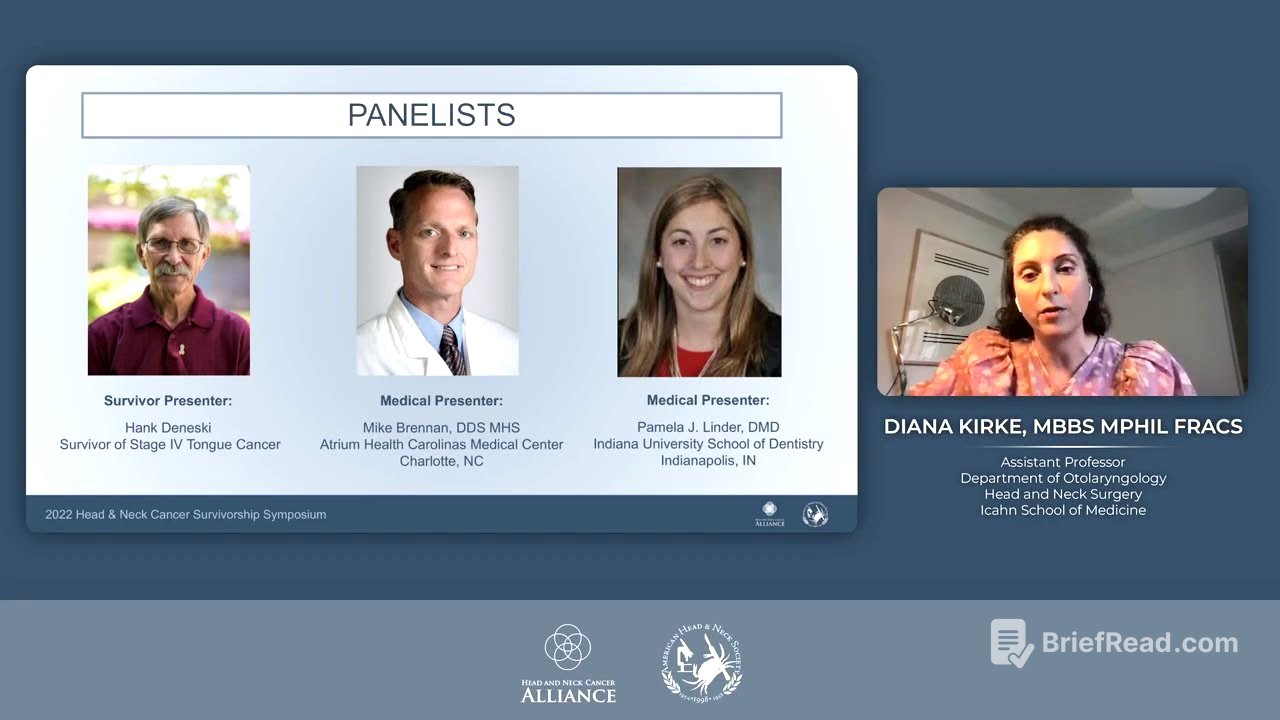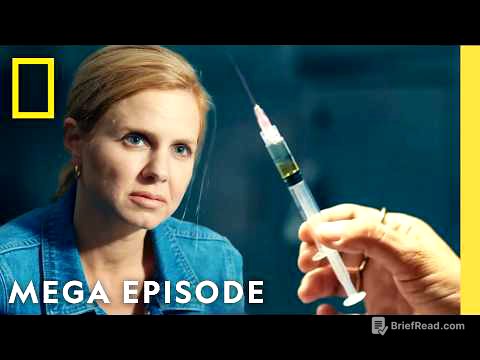TLDR;
This video is a recording of the Head and Neck Cancer Alliance's 2022 patient survival seminar, focusing on dental care during and after head and neck cancer treatment. The session features Dr. Diana Kirke as the host, along with medical speakers Dr. Pamela Linda and Dr. Mike Brennan, and survivor presenter Hank Donieski. The discussion covers the importance of dental health in overall cancer treatment, potential complications from treatments like radiation and chemotherapy, and strategies for maintaining oral health.
- Importance of dental health during cancer treatment
- Potential complications from radiation and chemotherapy
- Strategies for maintaining oral health
Introduction and Speaker Introductions [0:14]
Dr. Diana Kirke introduces the Head and Neck Cancer Alliance's 2022 patient survival seminar, focusing on dental care during and after head and neck cancer treatment. She introduces herself as an assistant professor in the Department of Head and Neck Cancer Surgery at the ICANN School of Medicine at Mount Sinai. She then introduces the medical speakers, Dr. Pamela Linda, a clinical assistant professor and head of the dental department at Indiana University School of Dentistry, and Dr. Mike Brennan, a professor and chairman of the Department of Oral Medicine at Atrium Health Carolina. Additionally, Hank Donieski, a survivor presenter, is introduced to share his experiences.
Hank Donieski's Presentation: Surviving Head and Neck Cancer [0:54]
Hank Donieski emphasizes the importance of having a support system and understanding test results. He stresses the need for comprehensive dental evaluation before starting cancer treatment to ensure the mouth, gums, teeth, tongue, and oral tissues are in good health. Discussions with a dentist about toothpaste, mouthwash, fluoride gel, and mouthguards are crucial, along with addressing any cavities, tooth loss, or dentures. Ongoing care during treatment is vital to prevent infections. He advises asking for referrals to experienced oral surgeons. A thorough physical exam by a primary care physician and evaluation by a speech-language pathologist are also recommended to establish a baseline for speech and swallowing issues.
Building a Multidisciplinary Team and Maintaining Oral Health [4:01]
Donieski advises building a comprehensive care team, including ENTs, oncologists, surgeons, speech-language pathologists (SLPs), and dentists, providing them with detailed contact information. Coordinated care is essential for survival. He highlights that each treatment plan is unique and should be thoroughly discussed with the care team, including any alternative treatments. Maintaining oral health is critical, as oral issues can impact overall health. He outlines ten steps for optimal oral care, including daily mouth exams, frequent teeth and gum cleaning with fluoride toothpaste, regular mouth rinsing, using non-flavored lip balm, drinking plenty of caffeine-free and sugar-free fluids, avoiding alcohol and tobacco, and consulting an experienced dentist.
Managing Treatment Side Effects and Long-Term Survival [6:47]
Donieski discusses potential early treatment side effects like tooth decay, oral mucositis, hypertension, dry mouth, thyroid issues, tissue necrosis, and swallowing problems. He advises consulting the appropriate specialist for each issue, such as radiation for skin problems or chemotherapy for fatigue. He stresses that the treatment plan is unique to each individual and that alternative treatments should only be considered with the approval of the medical team. The connection between oral and systemic health is highlighted, noting links between oral health and conditions like heart disease, diabetes, stroke, dementia, and rheumatoid arthritis. Post-treatment, it's important to work with all doctors to create a survival plan, schedule regular check-ups, and address any long-term side effects.
Dr. Pamela Linda: The Importance of Oral Care in Head and Neck Cancer Treatment [10:25]
Dr. Pamela Linda discusses the importance of considering oral health and preparation in the context of head and neck cancer treatment. Maintaining oral function is crucial for overall health, nutrition, aesthetics, and psychological well-being. A dentist should be part of the team to optimize oral health before treatments like surgery, radiation, or chemotherapy. Regular appointments are necessary for early detection of disease or metastases. She references Hank's survival story, emphasizing the need for excellent oral health education due to the high risk of tooth decay, dry mouth, opportunistic infections, and long-term consequences like trismus and osteonecrosis.
Complications of Head and Neck Cancer Treatments [12:04]
Dr. Linda explains that treatments for head and neck cancer, such as radiation and chemotherapy, often lead to significant changes in the oral environment. Irreversible changes can occur with radiation doses as low as 25 Gray, with typical treatments exceeding 60-70 Gray. Common complications include salivary gland hypofunction, dry mouth, taste changes, oral discomfort, difficulty eating, and dysphagia. Other issues include changes in saliva viscosity and conditions like hairy tongue.
Preventing Tooth Decay and Managing Oral Complications [13:38]
Dr. Linda emphasizes the importance of educating patients about the known changes that occur with treatments like radiation and how to prevent them. The primary focus is on combating tooth decay, which becomes rampant in cases of dry mouth. Frequent dental visits and patient compliance are essential. Patients are advised to maintain a relationship with their dental team as part of their medical team, with more frequent visits in the initial years after diagnosis and treatment. At-home fluoride care is recommended, using trays or other methods to continuously bathe the teeth in nutrients that combat dry mouth.
Addressing Patient Habits and Pharmacological Interventions [15:30]
Dr. Linda discusses the need to identify patient habits and predisposing factors for complications related to dry mouth and radiation treatment. Oral candidiasis and opportunistic fungal infections are important for dentists to recognize and advise on. Patients with dentures should maintain proper denture hygiene and avoid sleeping with them in to prevent fungal infections. The option of increasing saliva through pharmacology is discussed, noting that while there are medications like cyanogen available, they only have about a 50% positive response rate and often come with other side effects that patients may find unacceptable.
Minimizing Radiation Impact and Preventing Osteoradionecrosis [16:57]
Dr. Linda stresses the importance of educating patients about the impact of radiation beams on tissues outside of cancer cells. While radiation therapy has advanced, it is not without scatter to adjacent tissues like muscles supporting the head, neck, mouth, and jaw function. This can lead to changes in muscle elasticity, known as trismus. Patients should be advised on exercises and physical therapy to maintain the ability to open their mouths. The goal is to preserve nutrition and dental access. A significant long-term risk of radiation treatment is osteoradionecrosis, a lifelong change in the bone due to reduced blood flow and oxygen. Extractions should be performed before radiation treatment to minimize this risk.
Managing Osteoradionecrosis and Chemotherapy Complications [19:08]
Dr. Linda notes that medical and dental teams can take steps to reduce the risk of osteoradionecrosis. If extraction is necessary, some providers use hyperbaric oxygen therapy to increase oxygen levels in the area. Osteoradionecrosis presents as exposed bone that does not heal and often requires surgical removal. She also addresses common complications from chemotherapy, noting that many side effects are transient as cells regenerate after the chemicals have done their work. Oral mucositis is a common issue, but with palliative care from the medical and dental teams, patients can maintain their ability to eat and recover positively.
Dr. Mike Brennan: Maxillofacial Prosthetics and NIH Study Results [21:42]
Dr. Mike Brennan discusses maxillofacial prosthetics as options for head and neck cancer patients who need to replace anatomical areas after cancer resection. Common prosthetics include artificial eyes, noses, palates, and ears. Resection can sometimes involve part of the jaw, which can also be replaced to restore function. He presents examples of nasal, palatal, and ear prosthetics, as well as mandibular replacements. He then discusses an NIH-funded study involving 572 head and neck cancer patients who received radiation therapy, with patients evaluated before radiation and every six months for two years after. The study is now being renewed for a follow-up examination seven to eight years post-radiation.
Key Findings from the NIH Study on Oral Health After Radiation [25:32]
Dr. Brennan reviews key findings from the NIH study, emphasizing the importance of understanding the frequency and risk factors of post-radiation complications. Approximately 18% of teeth were lost within two years of radiation therapy. Significant risk factors included starting with fewer teeth, greater reduction in salivary flow rates, and poor adherence to daily brushing and flossing. Patients with greater gum recession experienced increased decay in those areas. About 6% of participants had exposed bone, with 3.1% confirmed as osteonecrosis after six months. Higher radiation doses, pre-radiation tooth extractions, and current smoking increased the risk of osteonecrosis.
Salivary Flow, Tooth Decay, and Summary of Key Points [29:53]
Dr. Brennan continues reviewing the NIH study results, noting that stimulated salivary flow significantly decreased six months post-radiation, with some recovery by 18 months. Patients with greater loss of salivary flow reported more complaints of dry mouth, sticky saliva, and difficulty swallowing. There was an increase in tooth decay in the first two years after radiation. Patients who used fluoride daily, maintained good oral hygiene, had dental insurance, and had higher education levels were less likely to experience tooth decay. He summarizes that oral health is an important factor in the overall systemic health of head and neck cancer survivors, and preventative education is essential.
Key Points for Follow-Up and Oral Hygiene Protocols [32:18]
Dr. Brennan outlines key points for follow-up care, emphasizing the importance of close monitoring with a dentist, especially in the first year, to detect and address tooth decay early. Strict oral hygiene protocols, including brushing, flossing, and prescribed fluoride, are crucial. Xylitol or artificial saliva can help combat decay. Fluoride varnish and chlorhexidine are other options. Nutritional counseling is important to avoid sugary substances. He provides examples of resources for oral care for patients with head and neck cancer.
Q&A Session: Over-the-Counter Products and Acupuncture [33:51]
Dr. Kirke moderates a Q&A session. Dr. Linda discusses the limitations and effectiveness of over-the-counter oral products like Biotene, noting that their success varies by individual. She finds that Biotene mouthwash is a favorite among her patients for providing a sense of moisture. Dr. Brennan addresses the possibility of overdoing oral care, noting that excessive brushing can lead to gum recession. He recommends using a tongue scraper but advises against overdoing it. Both doctors agree that acupuncture can be beneficial for saliva production, with Dr. Brennan noting that its effectiveness depends on the amount of functional saliva remaining after radiation.
Q&A Session: Acupuncture Experiences and Managing Osteoradionecrosis [39:01]
Hank Donieski shares his positive experiences with acupuncture, noting that it helped restore his saliva to 85% of his baseline after radiation treatment. He emphasizes the importance of seeking a medically certified acupuncturist familiar with head and neck cancer. The panel then addresses questions from the audience, including treatment for osteoradionecrosis, the use of medications for osteoporosis in patients who have received radiation, and whether dental work to replace teeth is considered a medical necessity.
Q&A Session: Dental Work Coverage and Dietary Considerations [43:42]
The panel continues to answer audience questions, including whether dental work to replace teeth is considered a medical necessity, noting that coverage depends on the state, insurance plan, and individual circumstances. They also discuss dietary considerations, recommending moderation with sugary drinks and immediate brushing and rinsing after consumption. Donieski shares that he primarily consumed tap water and black coffee without sugar during his treatment.
Q&A Session: Dental Options After Surgery and Managing Trismus [47:02]
The panel addresses questions about dental options after surgery, noting that the ability to get dentures depends on the extent of the surgery and remaining teeth. They also discuss managing trismus, recommending integration with providers experienced in treating head and neck cancer survivors and considering various treatment methods, including smaller dental pieces and, in some cases, operating room procedures. The importance of prescribed fluoride is emphasized for prevention.
Q&A Session: Finding Knowledgeable Dentists and Xylitol Use [50:11]
The panel discusses resources for finding dentists knowledgeable in head and neck cancer issues, recommending starting with the patient's existing head and neck team. They also address the use of xylitol, with Dr. Brennan noting its benefits for managing dry mouth at night but cautioning against excessive use due to potential TMD symptoms and gastrointestinal issues.
Q&A Session: Bone Health and Dental Implants [53:09]
The panel answers questions about bone health and dental implants, noting that the radiation dose is a key factor in determining long-term risks. Donieski shares his experiences with dental implants, highlighting the challenges and costs involved.
Q&A Session: Fluoride Trays and Sensitivity [56:57]
The panel discusses the use of fluoride trays, recommending custom trays for optimal exposure and suggesting wearing them for 20-30 minutes daily. For patients with fluoride sensitivity, they recommend meticulous plaque control, frequent brushing, and dietary restrictions.
Q&A Session: Oral Hygiene and Coconut Oil Rinsing [59:19]
The panel continues to answer questions, including the best oral hygiene system, recommending flossing and brushing two to three times a day. They also discuss coconut oil rinsing, noting that some patients find it helpful for dry mouth and mouth sores, although there is limited research to support its effectiveness.
Q&A Session: Finding Qualified Dentists and Managing Treatment [1:00:11]
The panel discusses qualifications to look for when seeking a dentist with expertise in treating head and neck cancer after radiation, recommending a hospital-based general practice residency or a degree in oral medicine. They also address managing dental treatment for patients at high risk for aspiration pneumonia, suggesting limiting treatment time, using a rubber dam, and considering operating room procedures.
Q&A Session: Toothpaste Recommendations and Burning Tongue [1:03:37]
The panel provides toothpaste recommendations for patients with sensitive mouths, suggesting plain toothpastes without tartar control or baking soda. They also discuss potential causes of burning tongue, including low salivary flow and fungal infections. Donieski notes that acidic foods can also trigger burning sensations.
Q&A Session: Fluoride Tray Protocols and Extractions [1:06:39]
The panel addresses questions about fluoride tray protocols, noting that some patients prefer to wear them even without fluoride for comfort. They also discuss extractions, emphasizing the importance of knowing the radiation level in the area.
Closing Remarks [1:08:50]
Dr. Kirke thanks the survivors, caregivers, speakers, and the Head and Neck Cancer Alliance and the American Head and Neck Society for their time and for organizing the webinar.









